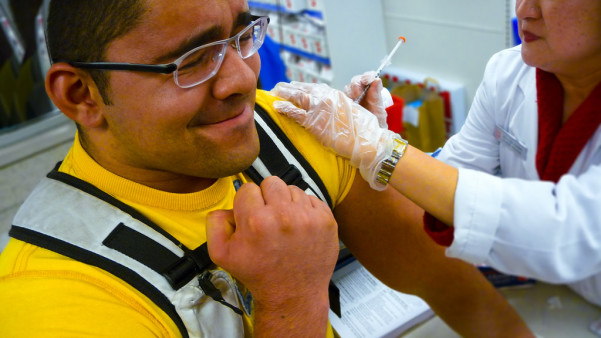Centers for Disease Control and Prevention (CDC) Epidemiologist Dr. Rebecca Martin cautions that the global eradication of measles may not occur by the proposed goal of 2020. Measles is an airborne virus that causes a highly contagious respiratory disease. Most commonly transmitted through the air by coughing and sneezing, measles is particularly dangerous for young children. Measles can cause serious complications that can lead to death such as encephalitis, blindness, severe diarrhea, and pneumonia. Globally, measles continues to be a leading cause of death in young children accounting for 145,700 deaths in 2013.
However, vaccinations have decreased the number of deaths from measles by 75% worldwide. The measles vaccination was first developed in 1963 and the measles vaccination program started shortly afterwards. Today, the measles vaccine is more commonly combined with mumps and rubella (MMR) or mumps, rubella, and varicella (MMRV). To address measles globally, the Measles and Rubella Initiative (M&RI) was a global partnership started in 2001 to reduce global measles mortality while eliminating measles and rubella. By raising the coverage of vaccines, investigating outbreak responses, and strengthening immunization delivery, the M&RI has prevented estimated 15.6 million deaths globally.
Before the vaccination was developed, nearly 4 million Americans got measles each year and 500 deaths resulted annually. Over the next few decades, the infection rate of measles steadily declined.
“In 2000, the United States was declared eradicated and eliminated from measles, which by definition is the absence of continuous disease transmission for 12 months or more in a specific geographic area.”
– CDC
While the elimination of a disease does not mean complete eradication, as imported measles cases can still result in new cases, the total number of cases annually in the United States has been significantly lowered since the vaccination was implemented. Between 2001 and 2012, the median measles cases annually was 60. The highest total in any given year during that period was 220 cases in 2011.
Unvaccinated individuals can contract measles from imported cases or from measles cases introduced into the United States, increasing the potential risk of spreading and jeopardizing the goal of sustained elimination that the U.S. has achieved since 2000.
“This is not a one-time shot in terms of an effort. You have to continually vaccinate each cohort of children as they are born and to make sure that you continue to have high immunization coverage to sustain the elimination goal.”
– Dr. Rebecca Martin
More recently, the anti-vaccination movement within the U.S. has made some parents think twice about vaccinating their children. One report frequently cited by anti-vaccination groups is one published in the Lancet that links autism to the measles vaccination. However, the paper was retracted in 2010 and the lead author of the report, Dr. Andrew Wakefield, had his medical license revoked. The data had been falsified along with some patients’ medical histories. The link between autism and vaccinations has not been scientifically proven. On the other hand, the significant decline in measles cases and death from measles indicate vaccinations work and they are effective.
Image Source: FREDERIC J. BROWN
Of great concern has been the drastic increase in the number of new measles cases in 2014. The 644 measles cases in the U.S. in 2014 is nearly triple the previous high in any given year in the last 14 years. The number of cases in 2015 has already reached 141 as of February 13, 2015 and is on pace to break last year’s record. At a cost of $1 per dosage of measles vaccination, it will take a few billion dollars to provide vaccinations globally. With every measles outbreak that occurs, extensive contact tracing must be done to try to contain the outbreak which draws resources and money away from the goal of global measles eradication by 2020. Moving forward, effective coverage of domestic and global immunizations is of utmost importance and an absolute necessity in order to achieve global eradication.
Feature Image Source: California Cow










